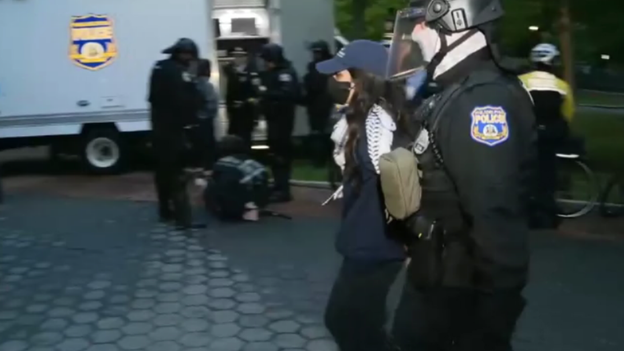The University of Pennsylvania reported that 33 people were arrested during the dismantling of an anti-Israel encampment on its Philadelphia campus. The encampment was removed early in the morning by the Penn Police with support from the Philadelphia Police Department. Protesters were given warnings that they were trespassing and offered the opportunity to leave voluntarily to avoid citation. Those who chose to stay were arrested and cited for defiant trespass. Interim UPenn President J. Larry Jameson and other university officials stated that the removal of the encampment was necessary to prevent violence, restore campus operations, and return the campus to the community.
University officials had been trying to engage with the protesters for nearly two weeks before deciding to dismantle the encampment. They stated that the protesters had been in violation of the university’s policies since the second day of the encampment and had not responded to outreach efforts, instead making unreasonable demands and escalating the situation. The officials emphasized that passion for a cause cannot supersede the safety and operations of the university, leading to the decision to remove the encampment with the support of local law enforcement.
Access to the College Green area, where the encampment was located, has been restricted until further notice by UPenn. The university stated that the protesters had repeatedly refused to disband the encampment, provide identification, stop threatening behavior, and comply with instructions from administrators and Public Safety. University of Pennsylvania associate professor Dagmawi Woubshet expressed sadness over the dismantling of the encampment, calling it a low point at the university. He highlighted that the students were engaging in peaceful, first amendment-protected free speech in support of Palestine and to demonstrate against the genocide in Gaza.
The removal of the anti-Israel encampment on the UPenn campus has sparked controversy and debate about the balance between free speech rights and campus safety. Some have criticized the university’s decision to dismantle the encampment, viewing it as an infringement on students’ rights to protest and express their views. Others have supported the university’s actions, citing the need to prioritize safety and operational concerns. The incident has drawn attention to the ongoing tensions surrounding the Israeli-Palestinian conflict and the ways in which it manifests on college campuses across the United States.
As the situation continues to unfold, it remains to be seen how the University of Pennsylvania and its community will navigate the aftermath of the encampment’s removal. The campus climate may be affected by the events, with potential implications for free speech, student activism, and the university’s relationship with its surrounding community. The incident serves as a reminder of the complex challenges that universities face in balancing competing interests and values while upholding their mission to provide a safe and inclusive learning environment for all students.


